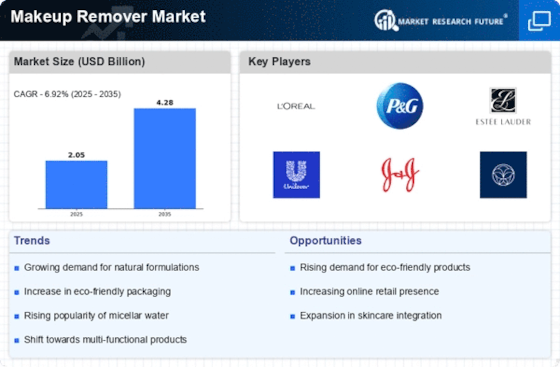Top Industry Leaders in the Makeup Remover Market

Market share analysis within the makeup remover segment is influenced by critical factors such as brand loyalty, product efficacy, and the ability to offer a diverse range of formulations suitable for various skin types. Pricing strategies play a significant role, with companies providing makeup removers across different price points to cater to a wide consumer spectrum. Establishing strong partnerships with retail chains, both offline and online, is imperative for market share, ensuring widespread product accessibility and visibility.
While established players dominate the makeup remover market, new and emerging companies are entering the arena with innovative approaches. These entrants often focus on natural and eco-friendly formulations, unique packaging, and targeted marketing strategies to carve out a niche for themselves. The agility of these emerging companies enables them to swiftly respond to changing consumer preferences, challenging the market dominance of established brands and contributing to the overall diversity of the market.
Industry news within the makeup remover market frequently highlights product launches, collaborations, and industry trends. Companies regularly introduce new makeup remover formulations, incorporating elements like gentle ingredients and innovative delivery systems. Collaborations with beauty influencers and dermatologists are commonplace to enhance brand visibility and connect with a broader audience. Trends such as the rise of micellar water and the growing demand for cruelty-free and vegan products shape industry dynamics, prompting companies to adapt their formulations and marketing strategies accordingly.
Current trends in company investments within the makeup remover market reflect a notable focus on research and development. Companies allocate resources to develop effective and gentle makeup remover formulations, explore sustainable and cruelty-free ingredients, and embrace biodegradable packaging solutions. Strategic marketing initiatives, including digital advertising and influencer partnerships, are employed to amplify brand presence and resonate with the target consumer demographic. Investments in sustainable practices align with the increasing consumer preference for ethical and environmentally conscious products.
The overall competitive scenario in the makeup remover market remains dynamic, with companies navigating evolving beauty standards and sustainability expectations. Established players face the challenge of maintaining brand relevance in a market where emerging companies are leveraging natural ingredients and sustainable practices to differentiate themselves. The competition is expected to intensify as new entrants gain recognition, introducing innovative formulations and challenging the market share of established brands. In this environment, adaptability, responsiveness to consumer trends, and a commitment to sustainability will be crucial for companies to maintain and enhance their competitive positions in the makeup remover market.
Industry News and Investment Landscape:
- Consolidation trends within the natural and organic market are indicated by recent acquisitions, such as Unilever's acquisition of Ren Skincare.
- A future-focused strategy is indicated by increased R&D spending, which focuses on creative ingredients, multipurpose formulae, and environmentally friendly packaging.
- The need for nourishing and gentle treatments is being driven by growing awareness of the detrimental effects that harsh makeup removal techniques have on skin health.
Key Companies in the Makeup Remover Market Include –
- Kimberly-Clark Corporation (US)
- L'oréal S.A. (France)
- Bobbi Brown Professional Cosmetics Inc. (US)
- Revlon Inc. (US)
- Unilever (Uk)
- Bare Escentuals Inc. (US)
- Beiersdorf Ag (Germany)
- Johnson & Johnson (US)
- Avon Products Inc. (UK)
- The Procter & Gamble Company (US)
- LVMH Moet Hennessy (France)
- The Estée Lauder Companies Inc. (US)
- Pandg (US)











